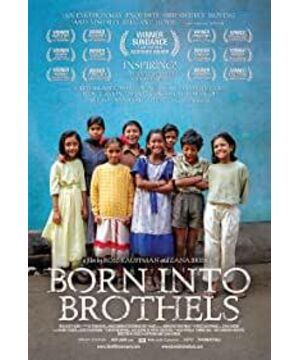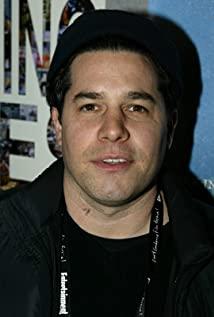"Born in a brothel"
(Born into Brothers—in honor of the women and children of the red right distract)
——Even if you are born in a brothel, you must give birth to ideals
Introduction:
aka: The Children of Kolkata's Red Light District
The whimsical world of a young photographer
Director: Ross Kaufman Zena Brisk
Region: India
Time: 2004
Length: 85 minutes
Winner: Best Documentary at the 77th Academy Awards
Kolkata red light district
In 1998, in Kolkata, India, a group of children grinned and walked through every street in the red light district. The cameras in their hands are recklessly aimed at every face, every wall, every piece of sky here...
What kind of street is this? A "den" of illegal prostitution that has been going on for many years from now on. There are men and women who are having sex and the woman's child is likely to be washed in an outhouse separated by a curtain. It is very likely that in a few days, I will be lying on the bed of a strange man...
filming of documentaries
It is with a very heavy and serious heart that I open this documentary. A long shot puts a child's eye in front of me. I don't know what kind of thoughts are conveyed in his eyes. But my intuition is empty, without any expectation, but there is an indescribable sense of maturity. In short, I felt uncomfortable, and there was an indescribable discomfort in my heart. The main body of the documentary revolves around a clue, the children's way of studying and transforming. It is also a clip from the state of children living in the red light district. These fragments appear to be unrelated on the surface. But if you analyze it in-depth, you will find a deep connection between them. From the camera's first entry into their lives, the joy and piety they showed, and then the children kept cruising through the streets to fiddle with their new partners. Then the director cuts the lens into the education of these children. until these issues are truly resolved. One last clip for us is Avijit going to Amsterdam for a photo exhibition. Let's see the limitless possibilities of a little photographer.
In the film, a large number of life scenes in the red light district are displayed through the children's vision and presented through the children's lenses. Because if it was Zena, their shots would be opposed by the locals. Children have certain "immunity". The children also recorded the most real and hard-to-understand situations in the red light district, reflecting their own living conditions from their perspective. Among them, there may be a cat sleeping in the garbage, a child washing dishes, their smiling faces under the tall palm trees, and the amazed expressions of pedestrians...
According to the director of the documentary, Zena Brisk, she initially just wanted to take some pictures of the prostitutes in Kolkata's red light district. However, when she went deep into the red light district, she was attracted by these children. These children live here with a different attitude. There are mainly eight children in the documentary. And these eight children have their own stories. Twelve-year-old Avijit is another bright spot among these children. He had ideals, he said: I used to want to be a doctor, then I wanted to be an artist, (and then I didn't expect anything) and now I want to be a photographer. Also, I remember quite a bit when he talked about his pissed off mom who is now a marijuana-obsessed dad, he said, "I love him despite what he's (so depraved) right now." Because he is my dad. But what most people may not know is that one of the heroines of the novel, Puja, has a relatively wealthy family. Her grandmother, grandmother, and mother are all prostitutes. In their eyes, Puja is a sign of a prostitute, and she is destined to become a prostitute in the future. She then went to a boarding school with Zena's help. However, in the end, she still stayed there and became the new top card in the red light district. Although Zena tried everything for her later, there was still nothing she could do. Unable to change Puja's tragic life. I really can't imagine that some people are born and their fate is already doomed.
This documentary does not go too much to echo the red light district of the slum in our impression. There is also no simple statement about the children taking pictures. Instead, the children's own ideas and propositions are recorded and expressed naturally through the lens. Not so abusive. Because you don't seem to see misery in the narratives of these children. It seems that this is life in their eyes. However, this is the saddest thing in my opinion. Here we can see the heart-to-heart exchange between Zena and the children.
The Value and Social Orientation of Documentary
However, this documentary has really changed the fate of some people. They did not perform according to the destiny arranged for them by the God of Fate. But rely on their own efforts and the help of others to rewrite their own destiny. Of course, there may be some of us who can't come across this kind of help. So this also shows the importance of this documentary all the more. Avijit then seized the opportunity and eventually walked out of the red light district to become a photographer. There are other children who also went to college to pursue their dreams with Zena's help. This can't help but remind me of a program on a domestic satellite TV where a "bad" child from a family in the city swaps identities with a "good" child in a backward mountainous area. But after the end, many parents of rural families reported that their children were no longer as active and sensible as before when they returned home after a trip to the city, but often complained about life. Also always wanted to contact established "dads" even though people didn't always pay attention to them. Of course, one or two of them have changed for the better. For these media like programming, maybe it's not enough for you to let your children see beautiful and prosperous things. You should also teach them how to choose and help them establish correct values. Instead of throwing it away after the media reaches its own ratings or other added value. Or maybe the media's efforts at these levels are still not enough. Documentaries like Born in a Brothel are worth watching. Somewhere in the world there are people who were born in a brothel but also have ideals. But if there are more "Zena" into this. Maybe not a little change.
View more about Born Into Brothels: Calcutta's Red Light Kids reviews








